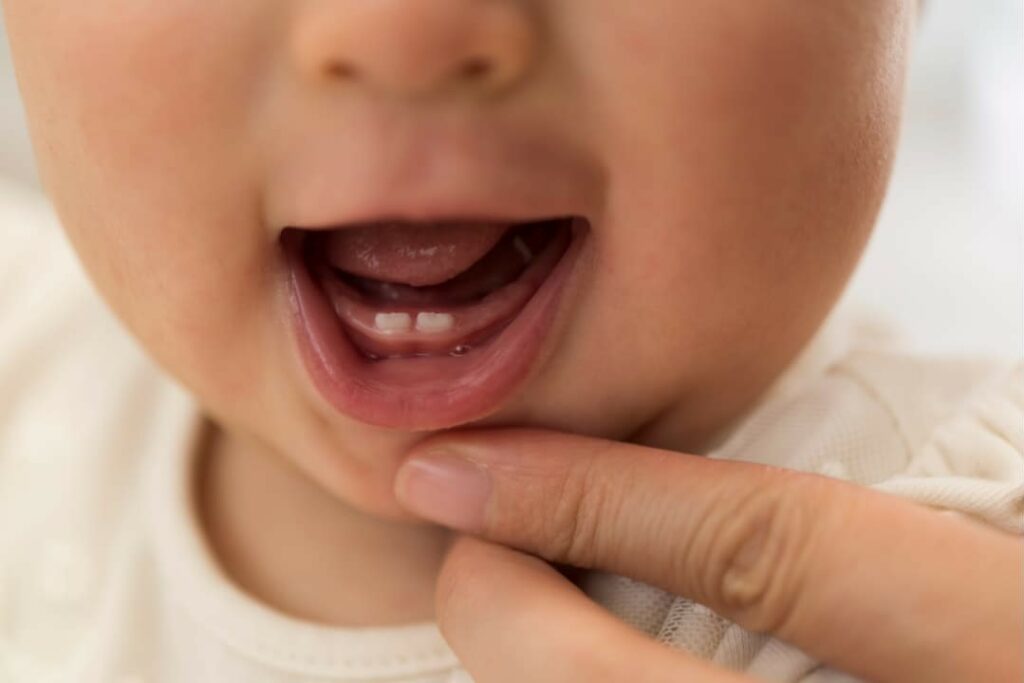
Teething is no fun! When the baby is teething, everybody has to deal with it.
You might find yourself feeling pretty desperate when you’re dealing with a teething baby because it can feel impossible to alleviate their pain. It’s hard to watch your baby suffer, but there are tips parents can use when their baby is teething that can help alleviate their pain.
There are many ideas floating around on the internet and in families about how to help your baby through the teething stage of infancy. However, your dentist can tell you which methods are considered safe and effective.
Use cold teethers to soothe your baby’s gums.
Your baby’s gums hurt during the teething process, but you can alleviate some of this discomfort by using a cold rubber teether. You can use a store-bought teether or even a silicone baby spoon. Place these items in the refrigerator and use them for brief – but useful – relief from the pain.
We do not recommend freezing a teething ring, as this will make it too hard, and it may hurt your baby’s gums. Additionally, you should avoid teethers that are filled with liquid. You don’t want the teether to rupture and create a choking hazard.
Offer cold foods to alleviate teething discomfort.
In addition to teethers and teething rings, you can also offer cold foods. Watermelon, cucumber, blueberries, strawberries, chilled homemade applesauce, chilled avocado, yogurt, and other refrigerated foods are an excellent natural strategy! Use snack time to reduce the discomfort that a teething baby feels.
Pressure can ease teething pain.
After washing your hands, you can use your finger or a wet piece of gauze to gently rub the baby’s gums.
You can massage your baby’s gums as many times during the day or night as you need to. Plus, if you use this time to sing or talk to your baby, that close, soothing contact can be a comfort to them, too. When a baby is teething, they often need extra comfort and patience from their parents and caregivers.
Be careful with over-the-counter medications and remedies.
There are numerous items in stores that are marketed as teething remedies or pain relief, including:
- Over-the-counter infant pain medication (acetaminophen and ibuprofen)
- Homeopathic teething tablets and gels
- Tooth pain medications like lidocaine
- Avoid products with benzocaine as they can be associated with a condition known as methemoglobinemia interference with oxygen carried in the blood.
We recommend using over-the-counter infant pain medication if your baby or toddler is feeling very cranky or seems to be in a lot of pain. Still, it is important to follow the instructions and avoid giving too much medication. You may also speak with your pediatrician or dentist during your next appointment.
Be cautious when using homeopathic teething tablets and gels, as the ingredients are often not strictly regulated. The FDA warns that homeopathic teething tablets may contain elevated levels of belladonna. Belladonna is a naturally occurring compound that can cause seizures and breathing difficulties. Always check with your child’s provider for guidance.
Similarly, benzocaine and lidocaine are unsafe for babies. There have been instances of infant fatalities that have been traced to these ingredients, which can be found in local anesthetics labeled for infant teething use. Poison Control warns that these should never be used for children under the age of 2, even if they have been labeled as being for children.
Do not use amber teething bracelets, necklaces, or anklets.
Amber teething necklaces have been popularized in the past couple of decades as a natural teething remedy. In theory, the baltic amber beads release pain-relieving succinic acid when they heat up from regular wear. However, this has not been proven. They are a choking hazard too much of a risk, and pose a serious strangulation risk, too.

Don’t dismiss symptoms of illness as teething symptoms.
Although the eruption of baby teeth may cause a low fever and irritability, teething is not an illness. Sometimes, well-meaning individuals will chalk every possible symptom up to teething. This can lead to accidentally overlooking signs of a real illness.
If your child is vomiting, running a high fever, running a low or high fever for several days at a time, experiencing diarrhea, coughing, and congestion, it is best to check in with your pediatrician, as these are not typical signs of teething.
Other Teething FAQs
In addition to tips parents can use when your baby is teething, here are some other common questions that our patients at Ashburn Children’s Dentistry have asked us about teething.
When does teething begin?
Teething typically begins around 6 months of age. There are rare circumstances in which babies are born with one or more teeth already erupted. Other children will not begin teething until after their first birthday.
How long does teething last?
It’s a terrible fact, but teething comes and goes for most of childhood! The “worst” part of teething is usually between about 10 months to 2.5 years of age. The good news is that it won’t be constant. Kids are officially done teething when their permanent molars have come in.
What are the most common symptoms of teething?
There are many signs of teething, and not all children will experience the same group of symptoms. Because babies can’t explain what they are feeling, it is important to watch for symptoms. Some of the most common signs of teething in infants include:
- The gums are red where the tooth is going to erupt
- Running a mild temperature (under 100.4)
- Increased drooling, which may also cause a rash on the face
- Lots more chewing and gnawing than is typical
- Feeling anxious, cranky, or uncomfortable
- Poor sleep (difficulty falling asleep, wakefulness throughout the night, insufficient napping, etc)
Do babies act sick while teething?
Babies may act sick while teething, but many symptoms of common childhood illnesses are not associated with teething. This includes vomiting, high fevers, prolonged fevers, diarrhea, congestion, and frequent coughing.
Ashburn Children’s Dentistry Supports Children Develop Good Oral Health
We invite the families of Ashburn, Virginia and the surrounding area to join with us to promote good oral health from infancy onward! If you have questions about teething, brushing your baby’s teeth, or anything related to dental care and oral hygiene, reach out to us!
These tips for when your baby is teething may bring your baby and your family some much-needed relief. If you have questions about teething, contact us today to schedule your child’s appointment at our fun and stress-free pediatric dental practice.



